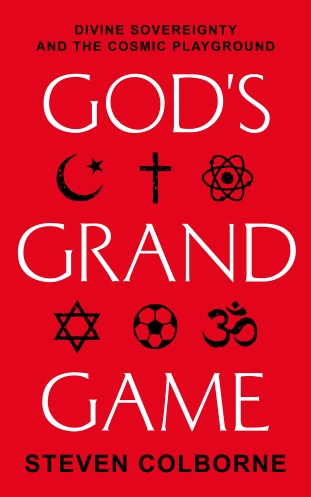God’s Grand Game is the latest book written by fellow blogger and friend Steven Colborne of Perfect Chaos. If you haven’t visited his blog before, please check it out here. I have known Steven since the earliest days of my blogging and he has been nothing but a kind and caring person, who always has a fascinating and knowledgable perspective on all things related to spirituality. So I was delighted to participate in his book tour of blogs.

His current book essentially sums up his theological understanding of God, its relationship with the universe and what we are in relation to God. If I had to throw a few labels onto his conception of God I would say it is a sort of hard panentheism that brings together ideas of a personal God from the Abrahamic religions and the panentheistic conception of the divine found in Hinduism.
To delve into Colborne’s idea a little deeper this means several things. Throughout the book, there is a stress on God’s omnipresence. God is so present in the universe that any separation felt is ultimately an illusion so that God can play his Grand Game of Hide and Seek, not dissimilar from the Hindu idea of Lila. Unlike what the mainstream of Abrahamic religions suggest, where God and the universe are separated by an enormous degree, or even wholly separate, God and the universe are one, according to Colborne. This means God not only is and controls everything in the universe, but also transcends the cosmos. However, God is not just the indifferent divine aspect that manifests the universe, like the Brahman or Tao. God is also personal. You can have a relationship with God. It’s like a person who loves a feature of him or herself, since all is one in God.
With God in control and being everything, this also means, crucially, that human’s ultimately have no free will. This is the key determiner that distinguishes Colborne’s metaphysics from those of virtually all of the other religions. Despite this minority stance, this does conform to the perspectives of many neuroscientists such as Sam Harris and David Eagleman and others. There is experimental evidence that we do not have free will and that it is an illusory epiphenomenon of the brain. Except where materialist scientists would say that biochemical and electrical reactions in the brain ultimately underpin the illusory sense of free will and are therefore the agents that really control our actions, Colborne argues that God is the ultimate source of this control.
God is the puppeteer and we and the universe at large are his puppets. God is in control of galaxies colliding into one another, the processes of evolution, individual atoms bonding and forming molecules, our thoughts and emotional states. Everything is God (omnipresent) and God is the ultimate controller (omnipotent).
With this conception of God at hand as the paradigm through which he analyses the world, he looks into various related topics throughout the book. He devotes a section to Christianity and how his conception relates to various key aspects of the religion, affirming some and refuting others. In another section he looks at several areas of science and offers his perspective within the framework of his theology. Other topics he looks at are concepts related to other religions of the world such as polytheism and karma.
Importantly, even though it is not the main point of the book, he dedicates Part V of the book to explain how morality works in a world where God is the absolute controller of everything, thus depriving us of free will. This would mean God is responsible for all the evils of the world from torturing children to the holocaust. We on the other hand are not accountable for our actions whatsoever.
This of course is a misreading of things, however, and I would be straw-manning if I left it there. No free will doesn’t mean anything goes, but rather everything is an expression of God’s will. However, due to the illusion of free will and that we appear to be able to harm and be kind to others, there is nothing wrong with making subjective attempts to create a prosperous, harmonious and happy society. God may even ultimately will this for us. Moreover, Colborne posits two ideas about the problem of evil if God is in control: 1. Perhaps God suffers with us (which brings in the idea of a personal God); 2. Perhaps Evil is a tool to bring out more good in the world. All the evils contain unforeseen goodness that comes as a consequence.
If unorthodox but compelling theology is of interest to anyone, I highly recommend reading God’s Grand Game. In this brief overview of Colborne’s ideas, I don’t quite do justice to how much is contained within this rather concise and easy to follow work that will certainly get you thinking about how one can understand and come to know the divine.
Click the link here if you would like to purchase a copy.

Pingback: Blog Tour (Day 1): A Perennial Follower – Perfect Chaos
I found the idea of evil provocative especially since I have had it my constant companion since my conception.
LikeLiked by 1 person
: )
You might like the Fallout (gaming) series, but — especially — your “conversation,” in Fallout 3, with (a href=”https://fallout.fandom.com/wiki/Nathaniel_Vargas”> Nathaniel Vargas, who is all about “my country right or wrong” or “my ‘representative’, right or wrong,” as the case may be.
Too funny! If you choose the dialogue option that intimates it is the duty of every American citizen to question the actions of their “authorities,” Vargas…won’t like it very much. But, he won’t hate you, either.
It will take his incarceration at the hands of “the Enclave,” for him to say, “They’re not who they say they are…. Get out while you can, before they get you too!” : )
LikeLiked by 1 person
A shoutout to Fallout is always welcome on this blog! 😀
LikeLike
God as “puppeteer” (and, moreover, “evil-doer”), eh?
Well, that’s a new one.
I’d recommend a revisitation of Faust by Johann Wolfgang von Goethe and, of course, biblical references to the idea that what is meant (or intended) for “evil” is turned to the “good” (this, of course, quite independently of our puny little egos), which is also, of course, a major component of Hermetic philosophy and Alchemy.
Naturally, we also see parallels in all the world’s “esoteric” traditions.
LikeLiked by 1 person
(That would be “Tantra” in the Hindu and Buddhist religions.)
Though it’s likely been all-but-forgotten, this is the reason that monks and nuns of various orders vow celibacy. It’s not that these orders originally had some puritanical, moralistic view of sex. The purpose was to reserve all their energies for the purposes of “alchemical” transformation.
LikeLiked by 1 person
LikeLike
This is an excellent review of Steven’s book, David. I usually struggle terribly with philosophical ideas but you’re right in saying that ‘God’s Grand Game’ is easy to follow. Not that it’s superficial – I am intrigued by the concepts that Steven has presented. It’s giving me so much to consider.
LikeLiked by 1 person
Thanks so much, I’m glad it’s received a warm response. I wanted to do some justice to Steven’s quite fascinating ideas.
LikeLiked by 1 person
Pingback: Blog Tour (Day 2): Madman’s Lantern – Perfect Chaos
This is really interesting, David. The notion of panentheism has long been of interest to me. This books sounds intriguing.
LikeLiked by 1 person
I really recommend the book, and Steven’s blog. He’s a lovely fellow who’s always up for a chat about the diverse world of spirituality.
LikeLike
Pingback: Blog Tour (Day 10): Think and Explore – Perfect Chaos